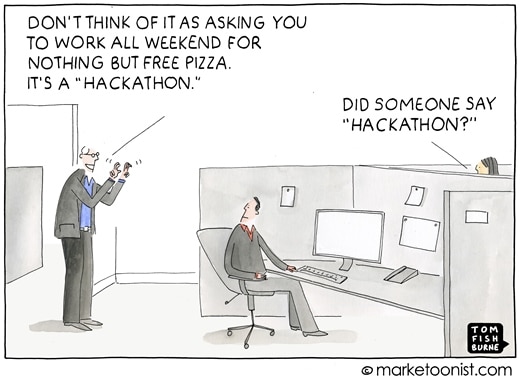Hackathon: The Answer to Your Business Challenges
I’ve had a fascination for hackathons ever since the scene in The Social Network where the students were writing code (and drinking shots) to compete for jobs at Facebook. Typically, I’ve heard about hackathons in the context of recruiting. But recently I’ve noticed a change when it comes to hackathons and their purpose. For example, LinkedIn held a “non-technical” hackathon to revolutionize human resources. It made me realize hackathons don’t have to be about people and competition. They can be focused on creativity and collaboration. I like that.
This year’s HR Technology® Conference is hosting a hackathon. I can’t wait to see it. To help us understand more about hackathons, I asked Steve Boese, co-chair for the event and a technology columnist and editor for LRP Publications if he would share some background with us. Luckily, he said yes.
Steve, what exactly is a “hackathon”? Initially, I thought they were focused on technology recruiting but then I saw the LinkedIn hackathon dedicated to workplace problem-solving. So, can you give us a definition?
Why should a company consider hosting a hackathon (over other types of team meetings or committees)? What are the benefits / results that make a hackathon the best option?
[Steve] Normally these are technical challenges, so companies that build their own technologies have typically been the ones who benefit the most from hackathons. They are a great way to allow employees to think creatively, try new ideas, and have fun with the side benefit of showcasing innovative ideas that may not been tried before. They don’t always have to be about technology solutions. Any company could apply the hackathon principles to any type of problem or challenge.
On the legal side, who owns the work products or ideas generated during a hackathon? If a company wants to host a hackathon, do they need to have participants sign release forms, etc.?
[Steve] For what we are doing at the HR Technology® Conference, each participating organization will retain all rights to whatever they develop. I think that when single organizations form internal hackathons that most of the time the organization overall will retain rights to whatever technologies their own employees create during the hackathon. So I think it can vary depending on the way the event is organized, who is sponsoring, and who is participating.
(Editor’s Note: Neither Steve or I are lawyers, so of you have any questions about who owns intellectual capital, please contact your friendly neighborhood attorney.)
Let’s look at the other side. Who participates in hackathons? If I want to participate in a hackathon, what types of skills do I need to have?
[Steve] Typically in a technical hackathon you will have a mix of software developers and engineers, designers and UX people, and possibly even some project manager types. Mostly, technical hackathons are exercises in ‘building’ things so the types of people in the organization who specialize in those functions are the usual participants. But in some internal hackathons sometimes other parts of the organization like marketing, HR, finance, etc. do get involved too as a way to learn more about how products are created and to lend their perspectives.
Tell us a bit more about the hackathon being held during the HR Technology® Conference and what attendees can expect to learn from it.
[Steve] At the conference this year we will host our first-ever HR Tech Hackathon. We invited 6-8 different HR solution providers who will compete in teams of 2 – 4 people. They will be given a ‘challenge’ or a business problem to take on and then have about 48 hours to build some kind of a technology to respond to that challenge. Each team will have 5 – 10 minutes to demo their solution during the conference in a general session.
Attendees will get a look at some really exciting and innovative technology and learn a little bit more about some of the behind the scenes activities that go into building new HR solutions.
Last question: As the person handling the logistics for the hackathon during the HR Technology® Conference, what do organizations need to know about planning a hackathon? Is there a checklist or reference guide for organizing one?
[Steve] There are some basic guidelines that have been published by various organizations that hold these events on a regular basis. They are not terribly difficult to organize. The three keys that need to be in place are:
- A good mix of participants
- A way to frame or set some context around the problem to be worked on
- The needed technical infrastructure to enable the hackathon participants to work
You just want to create an environment where people can have fun, think creatively, and show off their skills – whether it is a competition, for their internal colleagues, or even at a conference like HR Tech.
My thanks to Steve for sharing his expertise with us. If you want to read more of Steve’s insights, be sure to check out his blog and listen to his podcast, “HR Happy Hour.” I know he’s very busy putting the final details in place for the event. Speaking of which, if you’re not aware, Human Resource Executive® Magazine’s HR Technology® Conference is the leading global event for the HR technology industry. It’s not too late to register and save $100.00 when you use promo code LAUBY15 – check out the details here.
0